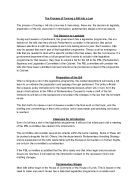The second reading is one of the most important stages. There is a certain amount of scrutiny of the content of the Bill. The House of Commons considers the principles; the merits and policies behind the bill. The opposition would then take the opportunity to question the government, minister or the promoter of the bill. This questioning is typically seen as a political debate.
As per s19 of the Human Rights Act (HRA), the Minister in charge of the bill would have to make a statement whether the Bill is in line with HRA and if the bill is not in line with HRA, the Minister would then make a statement that even though he is not able to make the statement of compatibility, he still wishes the House Of Commons proceeds with the bill. However some bills may proceed without s19 like the Dangerous Dogs Bills and the Child Support Bill. If the government is not able to convince the House of Commons, the bill will be defeated. Also if there is no debate during the second reading, bills will be sent to a second reading committee. To save time in the Chamber, only non-controversial Bills are referred to consider principles of the Bill. Once Committee approves the Bill, there will be no debate in Second Reading.
Next is the committee stage, all bills go to one of three committee types; Committee of the Whole House for constitutional Bills and parts of the Finance Bill, Public Bill Committee which is the most usual procedure; 16-50 MPs, in proportion to overall party strengths and the infrequently used select committee. A select committee would nominate the backbenches as members of the Public Bills Committee. The Public Bills Committee (PBC) goes through the bill, clause by clause, the bill undergoing the greatest scrutiny at this stage. Amendments can be made where certain clauses can be added or removed and the short title may be changed by the PBC.
Through the PBCs, loopholes may be eliminated as their purpose is to scrutinize bills and this detailed scrutiny reflects Parliamentary intentions. However PBC is known as a mini HOC and therefore majority of the members would be government supporters and may feel inclined to tow the party line and is not effective when it is a political manifesto. Hence, there may not be sufficient objectivity or neutrality in scrutinizing the bills. Bills, which may contain highly technical provisions on specialized areas would demand expert knowledge that members may lack of.
Hence, with quite a number of flaws, it would be good to reform, the PBC so it functions better. PBCs should be able to have the power to call for persons, papers or documentary evidence, to hire experts or consult experts when necessary. If the PBC were to be dealing with a highly specialized area, members should have good knowledge or expertise of the area.
Following the committee stage, there is the report stage. The committee is to report to the House the decisions and changes of the bill to save time. However for the Hunting Bill, the bill was sent to another PBC for scrutiny.
In the third reading, oral amendments are only allowed and the Bill is sent to the House of Lords (HOL) where the bill goes through a similar procedure to scrutinize government actions or policies. The bill going through the HOL can be seen as an important stage as members will render their expertise and experience to scrutinize bills in detail. So far, the HOL has used the Parliament Act 1911/1949 seven times in total and the Constitution Reform Act 2005 was invoked.
In the HOL its first reading is a formal presentation and the Bill is reprinted in the form finally agreed by HOC. The second reading includes debates on general principles of the Bill. Government Bills included in the election manifesto are, by convention, not opposed at the Second Reading, but ‘reasoned’ amendments may be tabled as a means of indicating dissent and can be voted on.
In the committee stage, Bills usually go to a Committee of the Whole House (in the Chamber) or Grand Committee (away from the Chamber) and rarely to other types of committee. There is a detailed line-by-line examination of the bill. Unlike the HOC there is no selection of amendments, all can be considered. Also debate on amendments is not timetabled or ‘guillotined’.
The report stage gives a further chance to amend the bill and can be spread over days. Unlike the HOC, ‘tidying up’ amendments can be made in the third reading. Issues debated and decided at an earlier stage cannot be reported. It is also the final opportunity for the members to comment and vote on the bill.
Then after the bill will be passed back to the HOC and then for Royal Assent. Royal Assent is obtained. The advantages of having such scrutiny is to give all members to consider details of the policies, MP/Ministers will be able to explain the reason behind the Bill and the Opposition can voice out their views. The disadvantages of having such a scrutiny is the fact that HOC dominated by government MP’s and may be influenced by pressure from groups, also the Parliament can cut short debating time.
In conclusion the legislative process is a very tedious process as it is a long one, since it goes through so many stages in the Houses. However this scrutiny ensures a separation of powers, bills give in to Parliament’s intention, which ensures parliamentary supremacy and hence rule of law upheld since an opportunity is given for all members to consider details of the policies.









